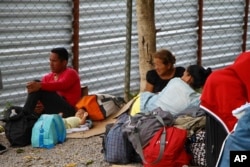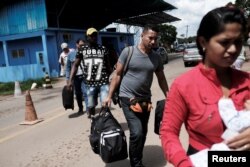Brazil won't close its border with Venezuela despite tensions that led to attacks on migrants who had fled to the border town of Pacaraima in the northern state of Roraima, an official said Monday.
Institutional Security Minister Gen. Sergio Etchegoyen told a news conference that closing the border would be illegal and wouldn't help ease the situation in the border town.
Residents of Pacaraima attacked Venezuelan immigrants on Saturday after a local storeowner was robbed, stabbed and beaten in an assault the Brazilians blamed on four immigrants. The owner — 55-year-old Raimundo Nonato de Oliveira — was discharged from hospital on Sunday.
"The closing of the border is unthinkable because it is illegal," Etchegoyen said.
Political and economic turmoil has driven tens of thousands of Venezuelans across the border, straining the capacity of small towns in the area to cope.
About 510,000 Brazilians live in Roraima and 12,000 of those are in Pacaraima, a city that has received five times its population in Venezuelan migrants.
Roraima state Gov. Suely Campos has pressured Brazil's federal government and judicial authorities to close the border with Venezuela or send enough help.
On Sunday, Campos requested that Brazil's top court temporarily suspend the immigration of Venezuelans into Brazil. There is no date for a court decision on the case, but a similar request was denied in April.
"Unfortunately it took a violent episode for the federal government to understand it needs to face this issue in an effective way," Campos said in a statement on Monday.
She is asking national officials for $45 million to compensate for spending by Roraima state since 2016, when the migration began to reach crisis proportions. The governor also wants Brazil's top court to establish an "immigrant quota" for each state so they can leave impoverished Roraima.
Roraima's Attorney-General Ernani Batista said that only 820 Venezuelan immigrants have been sent to other states since April.
"We cannot host 500 to 800 Venezuelans coming a day," Batista said. "Our main point with this request (to the court) is to send Venezuelans to other states and regions in Brazil."
Campos and several other local politicians who have called for the border to be closed are running for re-election.
Camila Asano, a director at Sao Paulo-based human rights organization Conectas, said the campaign trail rhetoric is one of the reasons for Saturday's violence.
"Federal and local authorities don't know what to do and are feeding this conflict with populist suggestions to close the border and establish quotas," Asano told The Associated Press. "Sending Venezuelans to other states doesn't solve the whole problem because many will stay in Roraima anyway because they are closer to the border, to their families.''
In a document filed to Roraima authorities, Campos said there is risk of "bloodshed" in Pacaraima and said "the chaos is a result of the omission of the federal government."
Etchegoyen, however, said closing the border "wouldn't help with the humanitarian situation in any way."
The minister said the situation in Pacaraima has calmed since Saturday, but no arrests have been made yet.
Brazil's federal government is sending 120 military-style police to Roraima. Half of that contingent has arrived in Boa Vista, but the other half has no date of arrival set.
Campos has asked for federal since 2016, shortly after President Michel Temer took office due to the impeachment of his predecessor Dilma Rousseff.
A document obtained by The Associated Press shows Campos requested assistance from then federal police boss Leandro Daiello for the first time on July 6 of that year.
"Because of the aggravation of the crisis in Venezuela, crime has risen in Pacaraima and in (Roraima's capital) Boa Vista, committed chiefly by Venezuelan citizens," the letter said. "I request emergency measures for a rigorous control of the entry of foreigners in the border area."
Other requests followed, but no meaningful steps were made, local authorities said.






